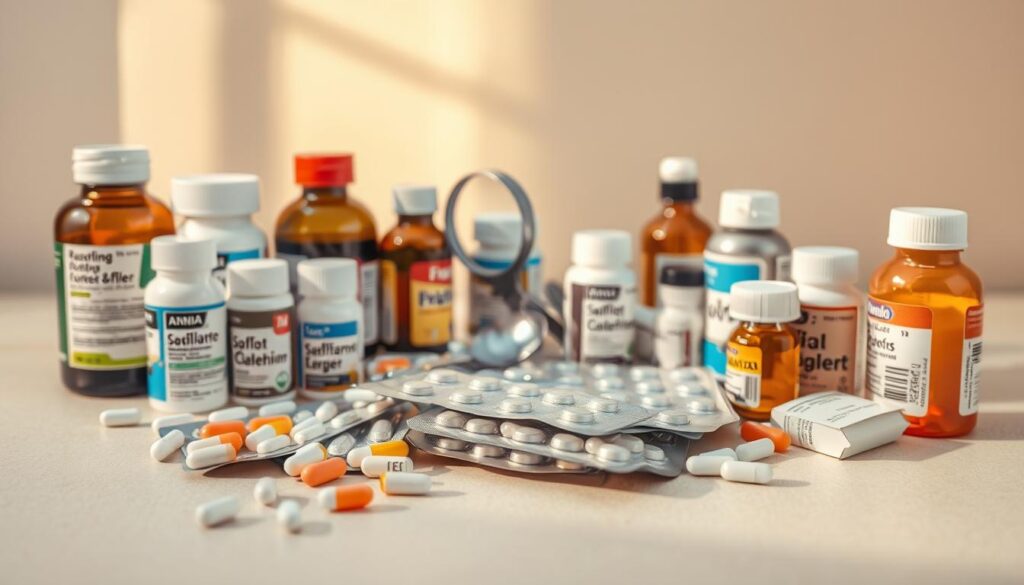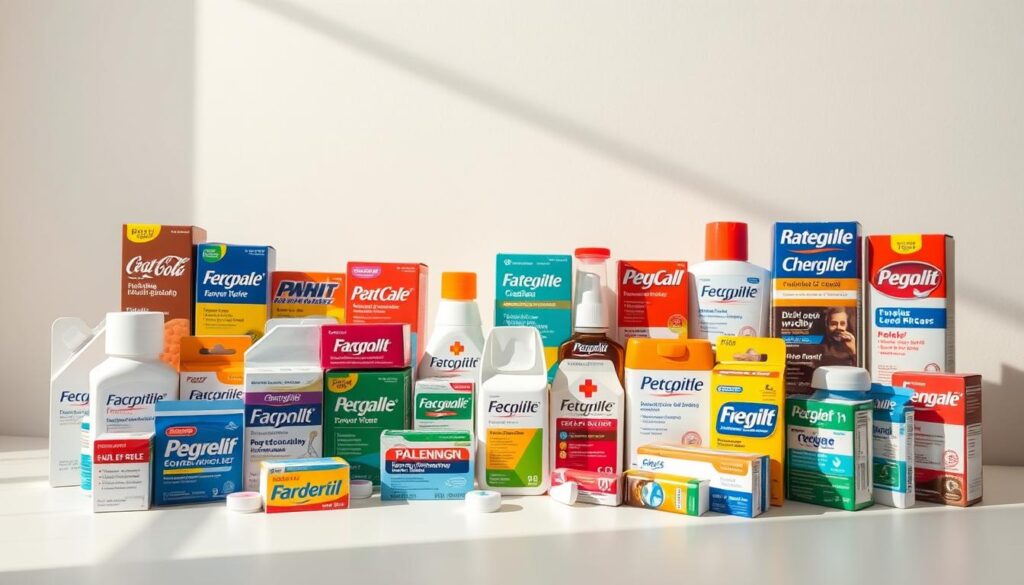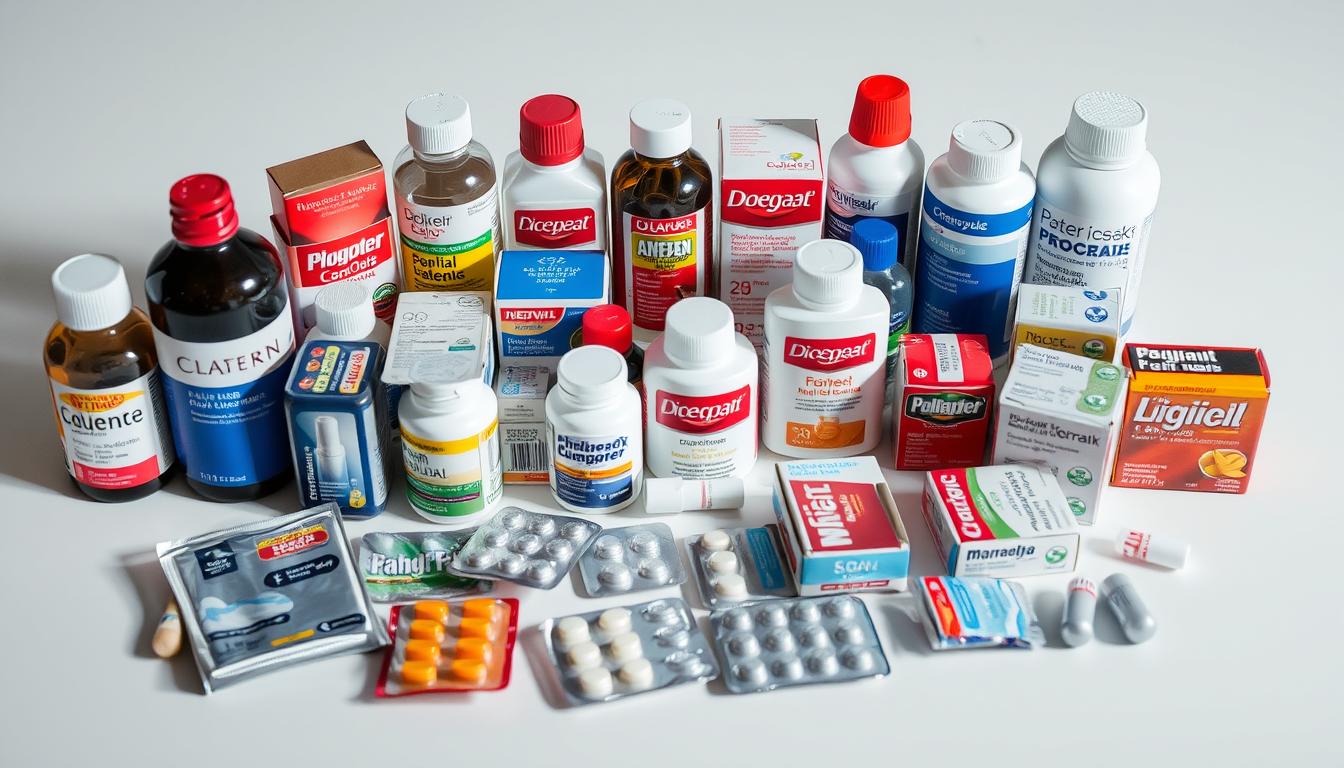Imagine never having to rush to the pharmacy for minor health issues. A well-stocked medicine cabinet with essential over-the-counter medications can be a game-changer. With about 70% of adults using these drugs yearly, it’s clear they’re a big part of our health care. But, which ones should you keep on hand to be ready for any minor health problem?
When stocking your medicine cabinet, think about the common health issues you and your family might face. You’ll need pain relievers, fever reducers, and medications for digestive health and colds. Having these otc drugs ready means you won’t have to make last-minute pharmacy runs. It ensures you’re always ready to take care of yourself and your family.
Key Takeaways
- Approximately 70% of adults use over-the-counter medications at least once a year, highlighting the importance of having a well-stocked medicine cabinet.
- Non-prescription medication, such as over-the-counter medication, can save you a trip to the pharmacy for minor medical issues.
- Over-the-counter drugs, including pain relievers and antihistamines, are essential for managing common ailments.
- A well-stocked medicine cabinet should include a variety of over-the-counter medications to ensure you’re prepared for any minor medical issue.
- By having over-the-counter medications on hand, you can avoid last-minute trips to the pharmacy and ensure you’re always prepared to take care of yourself and your loved ones.
- It’s vital to use over-the-counter medications safely and effectively to avoid any risks or side effects.
- Regularly checking the expiration dates of your over-the-counter medications is key to keeping them effective and safe.
Understanding Over the Counter Medication Safety
OTC medications are a big part of our health care. About 60% of all medicines sold in the U.S. are OTC. You can buy them at drug stores and grocery stores. But, it’s key to read and follow the label to stay safe.
If you want a doctor-approved guide on medication safety, check out The Home Doctor Book, which teaches you how to use common OTC medicines effectively and avoid dangerous interactions.
Recent stats show that 40% of adults skip reading the instructions. This can lead to misuse. The FDA and the Consumer Healthcare Products Association stress the need to understand OTC labels. By doing so, you can use OTC remedies safely and effectively.

It’s important to avoid taking too much or mixing OTC meds with others. Always check with a healthcare provider if you’re unsure. Also, store and dispose of OTC meds properly to prevent poisonings, mainly in kids. By following these steps, you can keep yourself and others safe.
Essential Pain Relievers and Fever Reducers
It’s important to have a variety of pain relievers and fever reducers in your medicine cabinet. Acetaminophen and ibuprofen are common over-the-counter options. They can help with headaches, toothaches, minor injuries, and fevers.
These medications are safe when used correctly. Acetaminophen should not exceed 4,000 mg in 24 hours to avoid liver damage. Ibuprofen can help with headaches, fever, and swelling from injuries or arthritis.
Consider other options like aspirin too. It can relieve pain and fever but be careful, as it may not be safe for everyone. Having different otc products and supplements ready can help manage pain and fever effectively.

Always follow the dosage instructions and talk to a healthcare provider if you’re unsure. Being informed and cautious ensures safe use of these medications. This keeps your medicine cabinet ready for any situation.
⇒Why You Should Put Garlic in Your Ear Before Going to Sleep (Video)
Digestive Health Medications
Having the right digestive health medications in your cabinet can really help. Antacids are great for quick relief from heartburn and indigestion. They start working in just 5 minutes.
Laxatives can help with constipation, and anti-diarrheal medicines can help with diarrhea. It’s important to pick the right medication for your symptoms. Some products, like fiber and probiotics, are good for daily use and can improve your digestive health over time.
Using the best otc medications is just one part of the solution. Making lifestyle changes can also prevent digestive issues. Avoiding certain foods, not exercising after eating, and reducing stress can all help your digestive health.
By combining common otc drugs with healthy habits, you can keep your digestive system in top shape. This reduces the risk of common digestive problems.
Cold and Flu Relief Products
Having the right cold and flu relief products in your medicine cabinet is key. Decongestants and cough suppressants are must-haves for easing symptoms. You can find these in otc drugs like Tylenol Cold and Flu Severe or Advil.
It’s important to know that over-the-counter medications can ease symptoms but don’t speed up recovery. For example, Advil can reduce fever and body aches. But, always follow the dosage and guidelines to avoid risks.
Expectoants like guaifenesin can help loosen mucus, making it easier to cough up. Antihistamines can also relieve congestion. But, talk to a healthcare provider before using them, as they can interact with certain conditions. Always read the label to avoid mixing medications that can cause overdose or interactions.
Remember, stay home for at least 24 hours after your fever goes away to prevent spreading the flu. Having the right products in your cabinet can help ease symptoms and care for you and your loved ones. Always check with a healthcare professional before giving medication to children. Be aware of the risks of ingredients like phenylephrine.
Common Over-the-Counter Medications for Allergies
Having the right otc remedies can greatly help with allergies. There are many options, like antihistamines and hydrocortisone cream. The U.S. Food and Drug Administration (FDA) says it’s key to pick the right one for you and use it safely.
Antihistamines, like diphenhydramine (Benadryl) and loratadine (Claritin), are often used. But, they can cause side effects like tiredness and dry mouth. Decongestants can quickly ease nasal and sinus congestion but might dry out your nose or cause sneezing.
There are more otc options for allergies. Corticosteroid nasal sprays can help with hay fever. Also, epinephrine shots are vital for anaphylaxis, a severe allergic reaction. Having the right otc remedies can help manage your allergies and keep you healthy.
When picking otc medications, always read the label. Be mindful of interactions with other drugs, foods, and drinks. This way, you can use otc remedies safely and effectively to relieve allergy symptoms.
First Aid and Topical Treatments
Every home needs a well-stocked first aid kit. It should have basic items like bandages, antibiotic ointment, and hydrocortisone cream. These can help with minor cuts, scrapes, and skin irritations. The American Red Cross says to keep first-aid kits in both homes and cars for quick access in emergencies.
Using your first aid kit right is key. You need to know how to apply bandages and use ointments. The American Red Cross offers classes to teach these skills.
It’s important to check your first aid kit often. Replace any expired or used items. You might also want a customized kit for your family’s needs. A small flashlight or headlamp is a good addition for any situation.
Your first aid kit should have more than just otc products. Include adhesive tape, gauze, and antiseptic solutions. Also, keep a list of emergency phone numbers handy. With a good first aid kit and knowledge of how to use it, you’re ready for minor medical emergencies.
Sleep Aids and Natural Remedies
Having the right sleep aids and natural remedies can greatly improve your sleep. Melatonin and valerian root are among the best over-the-counter (OTC) options. They help you fall asleep faster and sleep better. But, it’s important to use them safely to avoid side effects.
OTC sleep drugs often have antihistamines, which can lead to tolerance and decreased effectiveness. They can also cause a “hangover effect,” making you feel tired and unwell the next day. It’s wise to look for alternatives like chamomile tea and talk to a healthcare provider before trying any sleep aid.
Lavender and magnesium are also natural sleep helpers. They promote relaxation and better sleep. By adding these to your sleep routine, you can wake up feeling refreshed. Always follow the dosage instructions and talk to a healthcare provider if you have any concerns.
Related: Practical Medicine for Every Household
Creating Your Home Medicine Cabinet
Having a well-stocked and organized medicine cabinet can save you time and money. In the U.S., 1 in 3 adults don’t have one. It’s key to have essential over the counter medication ready.
About 50% of adults in the U.S. use otc drugs for minor health issues. This makes it important to have these medications available.
A good medicine cabinet should have pain and fever relievers like acetaminophen or ibuprofen. Also, include antacids and antihistamines. For common health issues, like colds and flu, have the right products.
When setting up your medicine cabinet, think about everyone’s needs. This includes children and adults. Keep child-specific medications, like decongestants and cough syrups, on hand.
By having a well-stocked and organized cabinet, you’re ready for any health issue. You can provide the care and relief your loved ones need.
When to Replace Your OTC Products
It’s important to check the expiration dates of your otc remedies. These products have a limited shelf life. About 30% of adults don’t check these dates before using their otc medications. This can lead to reduced effectiveness or even harmful side effects.
Storing otc products properly is key to keeping them effective. Heat, moisture, or light can damage the active ingredients. Store them in a cool, dry place, out of reach of children and pets. This helps keep your otc remedies safe and effective for longer.
Regularly replacing your otc products is vital for your health. It’s a chance to clean out your medicine cabinet and get rid of expired items. Keeping your otc products up to date ensures your home medicine cabinet is always ready to help when you need it.
Emergency Preparedness with OTC Medications
Being ready for emergencies is key. A well-stocked first aid kit with otc products is vital. Make sure your emergency bag has at least seven days’ worth of otc supplements and prescription meds. Include a printed list of all medications and how to take them.
This will help you act fast and right in an emergency.
When making a first aid kit, add otc items like antihistamines and pain relievers. Don’t forget stomach and antidiarrheal remedies, and antacids. You’ll also need antiseptic products, antibiotic ointments, and bandages for burns, cuts, and wounds.
Insect repellent and an eyewash solution are must-haves too. Check your emergency kit often. Update it for any expired or damaged items.
Always throw away expired medications safely to keep kids and pets safe. With the right otc supplements and meds, you’re ready for emergencies. Always follow the dosage instructions for otc products. If you’re unsure, talk to a healthcare professional.
Related: What Happens When You Take Expired Medications
Special Considerations for Households with Children
As a parent, it’s key to think about your family’s needs when dealing with best otc medications and common otc drugs. Making sure your medicine cabinet is child-proof is very important. This helps stop kids from taking medicines by accident. The CDC says a child goes to the ER for medicine poisoning every ten minutes.
Keep all medicines away from kids to avoid accidents. It’s also important to follow the instructions when giving your child best otc medications. Many parents don’t follow the dosing instructions, which can be harmful. Always give your child’s current weight to the doctor, as it affects the dosage.
Also, watch out for any allergic reactions, like to antibiotics like penicillin. About 4% of kids have an allergy to it.
Always read and follow the “Drug Facts” label. Have the Poison Help Line (1-800-222-1222) ready in your home for help. By being careful and aware of the common otc drugs at home, you can keep your child safe from medication mistakes.
Conclusion: Building and Maintaining Your OTC Medicine Supply
Keeping your over-the-counter (OTC) medicine cabinet stocked is key for handling minor health issues. It ensures your family stays healthy. Having a variety of OTC medications ready can help you tackle problems like pain, fever, and allergies quickly.
It’s important to regularly check and update your medicine cabinet. Make sure to throw away expired items and replace them with new ones. This way, you can be sure your family’s OTC medication is always ready to help.
Having a well-organized medicine cabinet gives you peace of mind. It means you’re ready to handle common health problems efficiently. By following the tips in this article, you can keep your family’s OTC medication supply up to date. This supports your health and well-being.








[…] Related: Top 10 Over the Counter Medication Every Home Should Have […]